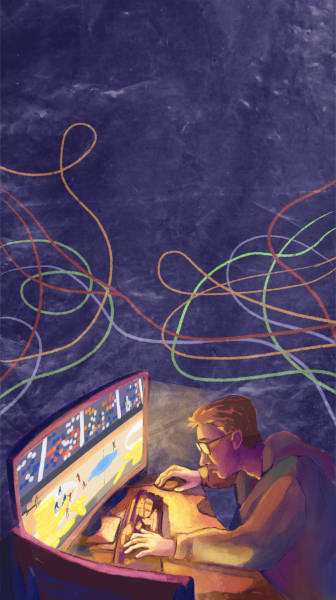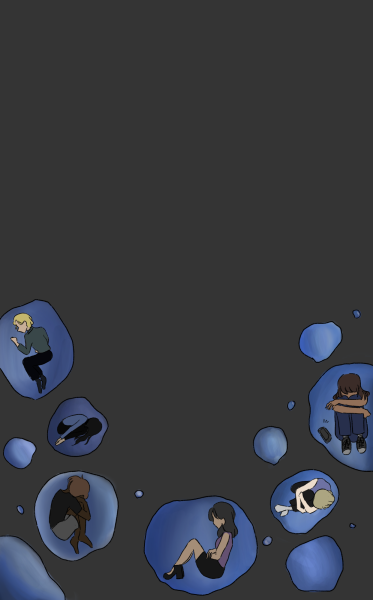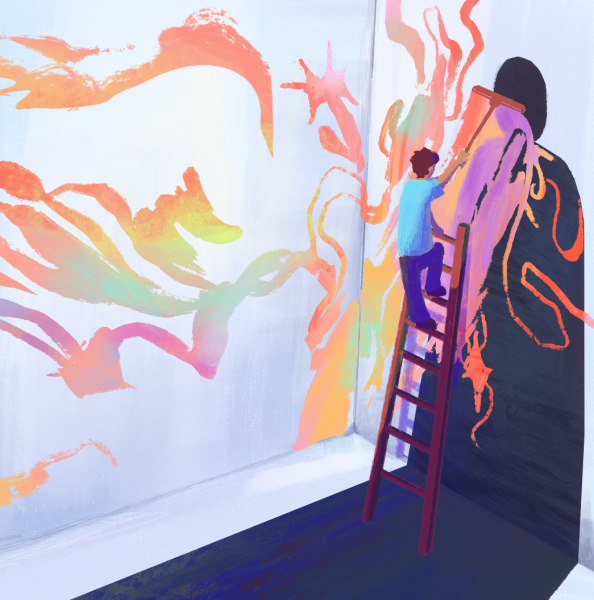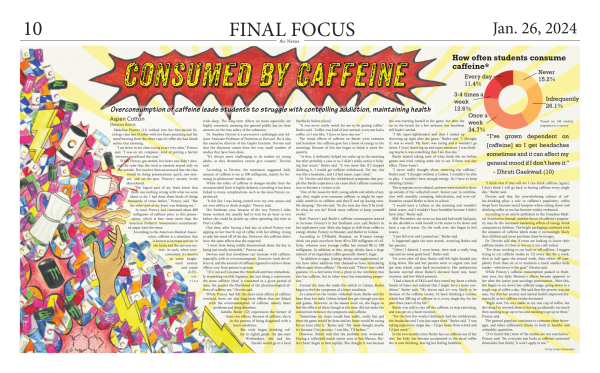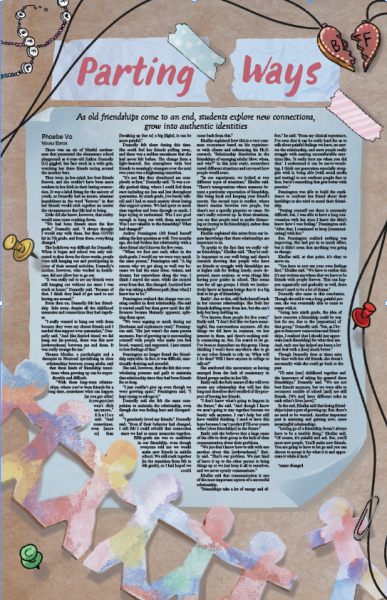Slipping from Sleep
By identifying and addressing the source of irregular sleep patterns, students improve their day-to-day lives.
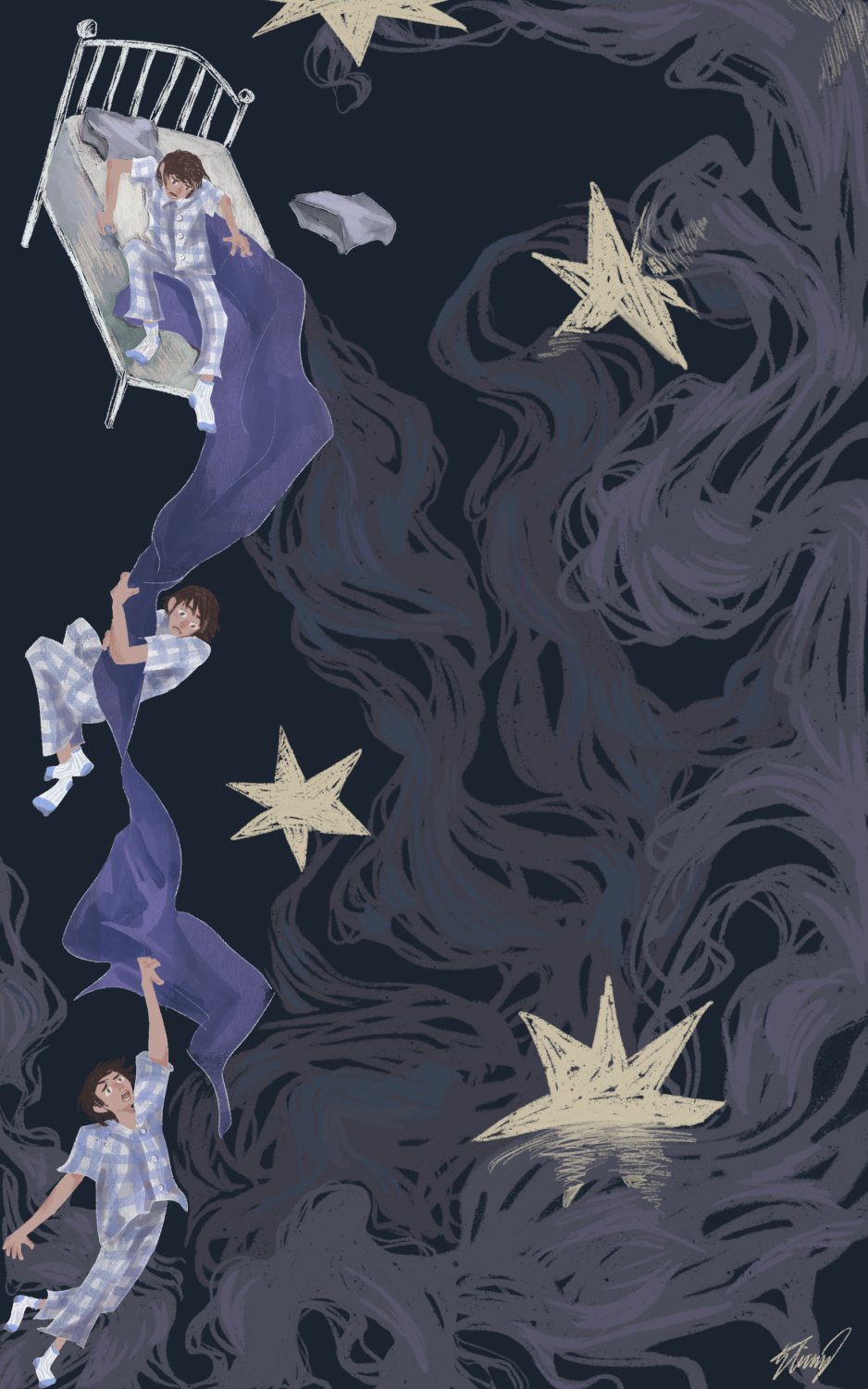
Kailyn Donnelly (10) had just barely gotten through another school day, exhausted beyond belief. She had felt tired and nauseous the entire day, which had been happening more frequently in the past year. At first she thought it was just a passing cold, or because she had just started a new anxiety medication.
“Just [by] standing up, I got really lightheaded and had zero energy,” Donnelly said. “There was one week where I felt so light-headed and dizzy 24/7. It was so bad. I was so nauseous and couldn’t do anything.”
These symptoms initially confused Donnelly, as she had felt healthy in prior years. Eventually, she said she just chalked it up to a few other things that were going on in her life at the time.
However, as many things ebbed and flowed in Donnelly’s life, the nausea, light-headedness, and especially the exhaustion, remained constant.
“When in Westview volleyball, I would have practices right after school, and come home and just crash straight away,” Donnelly said. “I was sleeping like literally the entire day.”
Later, after getting a diagnosis from her doctor, she found out that she was anemic.
Dr. Amy Lovejoy, a pediatrician working for Rady Children’s Hospital, talked about the effects of Donnelly’ s anemia on her body.
“In this disorder, the body does not have enough iron so it cannot make enough hemoglobin,” Lovejoy said. “Hemoglobin is very important to red blood cells, as it carries oxygen throughout the body to all the tissues. If your hemoglobin is low, you cannot deliver sufficient oxygen to all your tissues which leaves you tired.”
Even after three-to-four hour naps, Donnelly was still getting a full night’s sleep.
She was just as confused as her parents, who were starting to worry about her sleep schedule. Donnelly said she remembers feeling guilty and anxious about how much time she was spending asleep.
“Something I get a lot of anxiety about is time, time moving quickly,” Donnelly said. “It gives me a lot of anxiety because I want to make sure I’m living my life to the fullest so when I’ve seen how much time has passed, and I haven’t done x amount of things, it makes me feel pretty bad.”
The constant exhaustion from this condition caused a numbness in Donnelly, in addition to her anxiety. She was too tired to feel anything.
“I would just go home, sleep, wake up and stay up for an hour or two and then go back to bed until I awoke in the morning for school,” Donnelly said. “My brain just wasn’t able to indulge itself in lots of emotion.”
This sort of numbness followed Donnelly everywhere and made tasks like sitting through class or trying to study for tests nearly impossible.
“We would have several short quizzes or worksheets assigned every day [in chemistry], and I remember hardly engaging in class and completely shirking the homework,” Donnelly said. “All I wanted to do was put my head down or go home and sleep. My mental health was also struggling so I never had the motivation to even want to succeed.”
Yet Donnelly pushed through, and with help from her teacher, completed the class with an A.
“I was fortunate to have a really understanding teacher, and while most of his grace came from other things going on in my life, it really helped me at the time to be able to go home and sleep and wake up not stressed about homework,” Donnelly said.
This allowed her to put her best foot forward in her other classes, where she was also struggling. The exhaustion and consequential difficulties at school showed Donnelly how important getting a good night’s rest was.
Dr. Alex Dimitriu has completed training at the Stanford Division of Sleep Medicine. He also contributes to the National Encyclopedia of Sleep, attesting to the importance of getting a good night’s rest.
“Most fundamentally, sleep makes our impulse control worse, so it’s harder to stop runaway thoughts (anxiety), and also more easy to binge on things, because you cannot stop.This can be everything from internet use, social media, to food and even substance use,” Dimitriu said. “Not sleeping makes it harder to say no or to control oneself.”
Skylar Shean (10) has experienced this exact phenomenon. Shean, who has anxiety, found that sleep, or rather the lack of it, affects their condition in many ways.
“Without sleep, my anxiety is so much worse, but then that lack of sleep makes me anxious, and it becomes this kind of vicious cycle where I’m constantly losing more and more sleep,” Shean said.
Unfortunately, Shean’s anxiety was not the only contributor to their sleep deprivation.
During quarantine, Shean said that they felt isolated from the world, bogged down by homework. The nature of online school, and its usually disorganized structure, was difficult for them to navigate. They had to check Canvas, Google Classroom, and many other apps to find their assignments. Then, if they had a question on that assignment, they would have to wait multiple hours to hear back from their teacher.
“I just felt really stressed all the time because I had so much work to do,” Shean said. “I felt like night time was the one time where I could just forget about all of it.”
Shean viewed nighttime as an escape from all of their work. It was the one time they could relax: maybe watch a YouTube video or call a friend they had not seen face-to- face in a while. Shean’s bed-time started to get later and later as quarantine went on, and their anxiety never seemed to improve.
Lisa L. Lewis is a freelance journalist who helped pass the legislation for later start times in California schools. She said that a negative relationship with sleep can affect teens’ lives in many ways, more than just changing their mood.
“If you’re really tired, you can [end up] just staring at the same page for 10 minutes without really reading it,” Lewis said. “Just learning the info and retaining the information, which is the whole point of why you’re at school in the first place, is harder. It can also worsen mental health issues: depression, anxiety, [and] suicidal ideation.”
Quarantine not only affected Shean’s anxiety, but also their use of social media. They said that the lack of in-person contact caused them to reach out through the internet for the human connection that was so missing in their daily life.
“Sometimes I’d see messages from my friends and sometimes it said ‘oh hey someone commented on your post,’” Shean said. “It’s like ‘oh I should go check that’ and then suddenly I look up and it’d been an entire hour.”
Social media has endless opportunities for connection, of which Shean was deprived during quarantine. They said that sleep just seemed to feel less important to them and often was pushed back as a result.
“Everyone wants a marshmallow now, instant gratification,” Dimitriu said. “It feels much more fun to stay up late than to plan ahead, get to bed earlier and have a better day tomorrow.”
Shean said that after the change from online to in-person school, they tended to spend less time on their phone and more time sleeping.
“I really would just stay up talking with online friends for hours because I couldn’t see my in-person friends,” Shean said. “When I finally saw my friends from school, when in-person learning started again, I would feel like I didn’t have to talk to my online friends constantly, because I knew I would see my friends at school the next day.”
This, combined with the more structured and organized aspects of in-person schooling, led to the improvement of Shean’s sleep schedule. They were now going to bed at around 10:30, and usually getting about eight hours of sleep.
Donnelly, who had been struggling with the symptoms of her anemia even more as of late, finally went to the doctor and got some blood work done.
“It was a real kinda lightbulb moment [when I found out I was anemic],” Donnelly said. “I felt mild surprise, I knew what anemia was, I just never thought that I would ever have it. I wasn’t scared or worried because I knew it could be fixed easily by just taking iron supplements.”
For Donnelly, the nausea and exhaustion of her anemia finally came to an end with the administration of these supplements. Now, most of the symptoms of her anemia have abated, leaving her feeling happier and rested.
“Now that I’m taking iron, I’m able to stay awake better,” Donnelly said. “It definitely does not affect me as much as it used to. I now usually sleep like a solid 8-9 hours every night.”
With the re-emergence of her normal sleep schedule, Donnelly’s relationship to sleep began to improve. She said that her anxiety about wasted time started to diminish, as she began to view sleep as a necessity instead of a hindrance.
Donnelly now has time to focus on getting a good night’s sleep, without worrying about how many things she is missing,
“I don’t feel guilty for oversleeping, because sleep is a basic human necessity and nothing anyone has to feel bad about,” Donnelly said. “I no longer view it as a waste of time or an escape from reality. It’s something I still look forward to, not because I hate being awake, but because it energizes me and allows my body to rest so I can be productive the next day.”
As her iron supplements started to kick in, Donnelly remembered being able to participate in, and enjoy, the chemistry class she used to dread.
“I started taking interest in the class, and learned chemistry is really fun when you care about it,” Donnelly said. “I started retaining information better and looked forward to the class, not only for the content but the fun labs and laughing with my table. I wish I could have had that attitude the entire time, because I feel like I really missed out.”
Many things in Donnelly’s life began to improve as she started to enjoy sleeping. Her other classes became more enjoyable, and she was able to spend much more time with friends, as she was not spending as much time asleep.
As Lisa L. Lewis said, there are many reasons why most teens are sleep deprived, but one of the most common is being overworked. It may not be as simple to fix as it seems. “Just don’t do it” is difficult for students who are pressured by peers or parents into overloading themselves with assignments and homework.
“If you have too much going on, like homework, sports, other extracurriculars, and jobs, and there’s not even an 8-10-hour window at the end of the day or in the 24-hour cycle to get enough sleep, you might need to cut back,” Lewis said. “There’s also the pressure to do all these activities, and so that’s larger than just the teen. That’s also on the family and the parents, to see if the teens are spread too thin.”
According to the Youth Risk Survey,by the CDC, 72.7% of teens are sleep deprived. There comes a specific point where students need to take serious thought into making drastic changes to their sleep schedule. Dimitriu said that falling asleep unintentionally during the day can be a sign that you need to re-examine the times you go to bed.
“With even more severe sleep deprivation people can become delirious and even start to hallucinate as they effectively drift in and out of REM sleep.”
Dimitriu said that students should watch for these signs, and if experiencing them, should consider looking into the reason behind their sleep schedules.
But as Lovejoy said, there is hope at the end of the tunnel, as most sleep related problems are fixable.
“If sleep issues are caused by a medical condition such as asthma, anemia or reflux, fixing the medical issue can help with sleep,” Lovejoy said. “Cognitive behavioral therapy and/or medication can help with other sleep issues such as insomnia as well as anxiety/depression.”
Donnelly recalled the first moment that she felt her iron supplements kick in, and the joy that came with it
“I remember one day at club practice, when I finally felt energized enough to play at my best,” Donnelly said. “It was like a breath of fresh air after being suffocated for so long. I had forgotten what it felt like to not be tired. And the happiness that came with it was amazing. Finally, I could go home and stay awake to hang out with my family or do homework, [and] I was so grateful to be able to do that again.”



